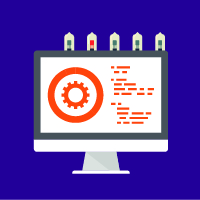
We have released and supported many reference datasets, software tools, packages and platforms over the years. Beginning with the MINC file format for imaging data, and including numerous image processing tools and pipelines, as well as databases and high performance computing clusters and grids, the BIC is a key resource for academic software development. Our Centre shares datasets and anatomical atlases with the public and other academic and industrial partners.
General Computing
-
Workstations, Computing and Data Storage
Our users are allocated a system account (currently about 350 active accounts) to access data storage space and distributed computing resources.
-
High Performance Computing (HPC) Queue
We provide a grid-computing cluster, composed of more than 550 CPU cores in varying memory configurations.
Data Hosting & Sharing
-
OMEGA
First open data repository fully dedicated to MEG
-

BigBrain
A freely accessible, microscopic resolution 3D model of the human brain.
-

LORIS
LORIS (Longitudinal Online Research and Imaging System) is web-based data and project management software for neuroimaging research studies.
-
Box.BIC Private Cloud
A user-friendly web-based file hosting service accelerating collaboration, and helping lab members organize & consolidate their files. Box.BIC is our instance of OwnCloud, the leading open source file hosting application.
-
Compute Canada
The BIC integrate storage and compute resources from Compute Canada, one of the largest research clusters in the country.
-

Brain Atlases and registration templates
There are various atlases that are available from the BIC in the MINC format. On the linked page you’ll find an overview of the atlas, methods, visualization, and a download of the atlas.
-
Brain Structures atlases
-

DMP Assistant
DMP Assistant is a web-based software for preparing data management plans (DMPs). The tool follows best practices in data stewardship and walks researchers step-by-step through key questions about data management.
Data Processing
-
MINC
MINC is a flexible, multi-modal format for medical imaging data, as well as a set of programming libraries and tools for manipulating and visualizing MINC files.
-

CBRAIN
CBRAIN is web-based software that allows neuroimaging researchers to perform computationally intensive analyses on data by connecting them to High-Performance Computing (HPC) facilities across Canada and around the world.
-

Brainstorm
Brainstorm is a collaborative, open-source application dedicated to the analysis of brain recordings: MEG, EEG, fNIRS, ECoG, depth electrodes and animal invasive neurophysiology.
-
CIVET
CIVET is an image processing pipeline for fully automated volumetric, corticometric, and morphometric analysis of human brain imaging data (MRI).
-
VoxelStats
VoxelStats - A MATLAB package for multi-modal voxel-wise brain image analysis. Developed by the Translational Neuroimaging Laboratory.
-
NeuroPM-box
NeuroPM-box - The Neuroinformatics for Personalized Medicine toolBox.
Visualization
-
Brainbrowser
BrainBrowser is an open source JavaScript library exposing a set of web-based 3D visualization tools primarily targetting neuroimaging.
-
IBIS Neuronav
IBIS (Intraoperative Brain Imaging System) is an Image-Guided Neurosurgery software platform.
-

xdisp
xdisp is an image display tool for X window systems developed by Bruce Pike.
-

Postf
Postf is a simple display program for medical image files, originally developed by Gabriel C. Léger.
-

MNI ray_trace
MNI ray_trace is not interactive; it is designed for the creation of static images from the command-line.
-

JIV2
JIV2 is a register-like program written in Java. It can be used to view more than one MINC volume related through an affine transform.
Neuroinformatics Tools and Analysis
-
Brainweb MRI Simulator
The SBD contains a set of realistic MRI data volumes produced by an MRI simulator. These data can be used by the neuroimaging community to evaluate the performance of various image analysis methods in a setting where the truth is known.
-
EMMA
EMMA (Extensible MATLAB Medical image Analysis) is a toolkit designed to ease the use of MATLAB in the analysis of medical imaging data. It provides functions for reading and writing MINC files, viewing images, performing ROI operations, and performing several popular analyses.
-
Glim Image
glim_image performs voxel-wise analysis on MINC images as it relates to a linear model, such as VBM (Voxel Based Morphometry), to examine the changes in segmented tissue matter (white matter, gray matter, CSF), or DBM (Deformation Based Morphometry), to run statistics on the cortical atrophy.
-
Surfstat
Surfstat is a Matlab toolbox for the statistical analysis of univariate and multivariate surface and volumetrics data using linear mixed effects models and random field theory.
-
RMINC
RMNC is an R based library for Voxel Based Morphometry analysis, created by Jason Lerch in the ACELab in 2005.
-
fMRIstats
fMRIstats is an fMRI statistical analysis toolkit implemented in matlab
-
NIAK
NIAK (Neuroimaging Analysis Kit) is an fMRI processing pipeline for Matlab and Octave.
-
N3
The N3 package, a part of MINC tools, implements a non-parametric method for correction of intensity non-uniformity in MRI data. Its use tends to be an essential first step in any processing sequence.
-
Registration Tools/ANIMAL
This family of algorithms linearly and nonlinearly register two images to each other. The most used, mritotal registers an MRI to standard Talairach space. They are all part of the MNI AutoReg package.
-
INSECT
INSECT is the algorithm to separate a structural MRI into it’s three tissue types: white matter, gray matter, and CSF. It is available as part of the classify packages in packages.bic.mni.mcgill.ca/.
-
BEAST
BEaST is a robust brain extraction method based on a multi-resolution patch-based framework.
-
CANDLE
CANDLE is a Collaborative Approach for eNhanced Denoising under Low-light Excitation (CANDLE) for the processing of 3D laser scanning multiphoton microscopy images.
-
SEAL
SEAL stands for “Sulcal Extraction and Labelling” - which pretty much explains its use as well.


















